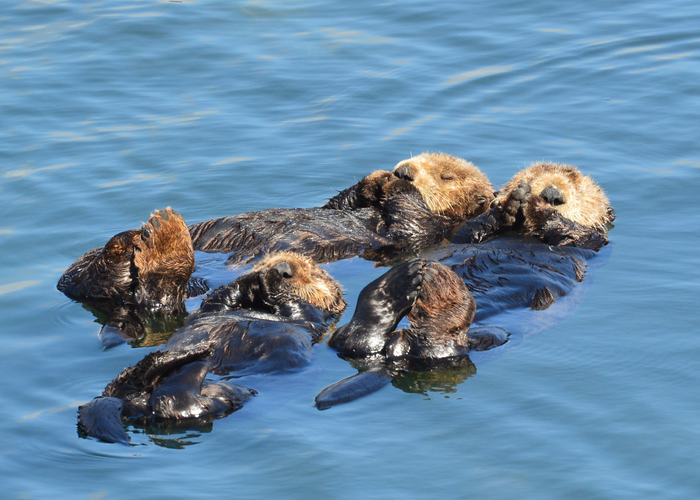Four sea otters that stranded in California died from an unusually severe form of toxoplasmosis, according to a study from the California Department of Fish and Wildlife and the University of California, Davis. The disease is caused by the microscopic parasite Toxoplasma gondii. Scientists warn that this rare strain, never previously reported in aquatic animals, could pose a health threat to other marine wildlife and humans.

Credit: Laird Henkel, CDFW
Four sea otters that stranded in California died from an unusually severe form of toxoplasmosis, according to a study from the California Department of Fish and Wildlife and the University of California, Davis. The disease is caused by the microscopic parasite Toxoplasma gondii. Scientists warn that this rare strain, never previously reported in aquatic animals, could pose a health threat to other marine wildlife and humans.
The preliminary findings, published in the journal Frontiers in Marine Science, note that toxoplasmosis is common in sea otters and can be fatal. This unusual strain appears to be especially virulent and capable of rapidly killing healthy adult otters.
The rare strain of Toxoplasma hasn’t been detected on the California coast before so is likely to be a recent arrival. Scientists are concerned that if it contaminates the environment and the marine food chain, it could pose a public health risk.
At present, no infections with the strain have been reported in humans.
“Because this parasite can infect humans and other animals, we want others to be aware of our findings, quickly recognize cases if they encounter them and take precautions to prevent infection,” said corresponding author Melissa Miller of the California Department of Fish and Wildlife. “We encourage others to take extra precautions if they observe inflamed systemic fat deposits in sea otters or other marine wildlife.”
Common parasite, rare outcome
Toxoplasma gondii is a common parasite hosted by wild and domestic cats and shed in their feces. Although healthy humans rarely experience symptoms, toxoplasmosis can cause miscarriages and neurological disease.
Sea otters are especially vulnerable to Toxoplasma infection because they live near the shoreline where they may be exposed to the parasite’s eggs in rainwater runoff, and they eat marine invertebrates that can concentrate the parasites.
The four sea otters described in this study stranded between 2020 and 2022. All had severe inflammation of their body fat — a condition called steatitis. Severe steatitis is a very unusual finding in sea otters with toxoplasmosis.
“The appearance of this lethal type of Toxoplasma in coastal California is concerning for two main reasons: First, because of potential population health impacts on a threatened species, and second, because this parasite could also affect the health of other animals that are susceptible to Toxoplasma infection,” said study co-author Devinn Sinnott of the UC Davis School of Veterinary Medicine.
Microscopic examination of tissues confirmed Toxoplasma as the cause of death for all four otters. High numbers of the parasites were observed throughout each body except the brain, which is typically one of the major organs affected in sea otters with fatal toxoplasmosis.
DNA testing identified a rare strain of Toxoplasma called COUG in all four cases. This strain was first found in 1995 in Canadian mountain lions during surveillance after a nearby outbreak among humans, but the strain of Toxoplasma responsible for the outbreak was never reported. Detection of COUG in sea otters is concerning for the health and recovery of this threatened species.
“This was a complete surprise,” said senior author Karen Shapiro of the UC Davis School of Veterinary Medicine. “The COUG genotype has never before been described in sea otters, nor anywhere in the California coastal environment or in any other aquatic mammal or bird.”
Sea otters under threat
All four otters stranded during periods of high coastal rainfall, which means they may have been exposed to Toxoplasma eggs via storm runoff. Although three of the otters stranded near each other, it is unclear whether they were all infected in the same location. How this unusual strain might affect humans or other animals is also unknown.
“I have studied Toxoplasma infections in sea otters for 25 years, and I have never seen such severe lesions or high parasite numbers,” Miller said. “We are reporting our preliminary findings to alert others about this concerning condition. Since Toxoplasma can infect any warm-blooded animal, it could also potentially cause disease in animals and humans that share the same environment or food resources, including mussels, clams, oysters, and crabs that are consumed raw or undercooked.”
With increased surveillance, the COUG strain may be identified in other animals.
“We still have much to learn,” said Sinnott. “Larger-scale studies are needed to understand the potential impact of infection by the COUG Toxoplasma strain on sea otter populations, how geographically dispersed it is, how it is being introduced into the ocean and what other animals might be affected.”
Journal
Frontiers in Marine Science
DOI
10.3389/fmars.2023.1116899
Method of Research
Meta-analysis
Article Title
Newly detected, virulent Toxoplasma gondii COUG strain causing fatal steatitis and toxoplasmosis in southern sea otters (Enhydra lutris nereis)
Article Publication Date
22-Mar-2023




